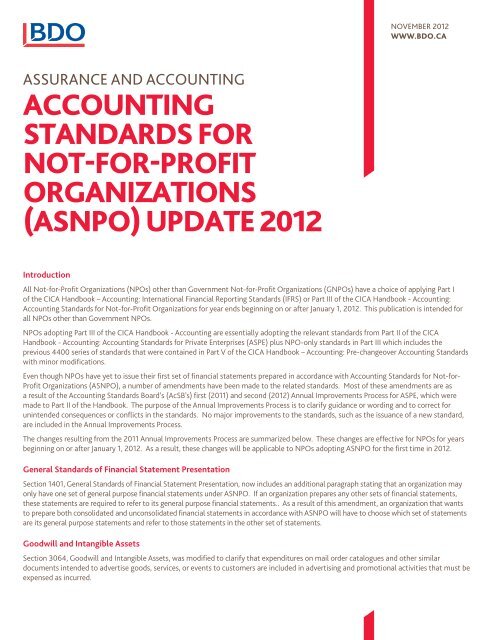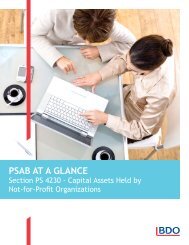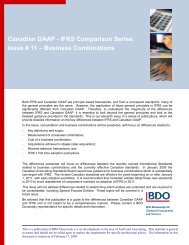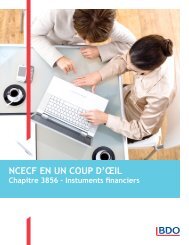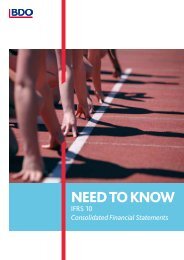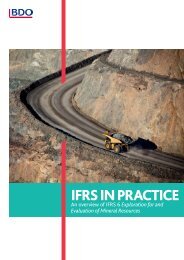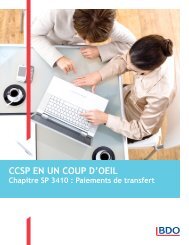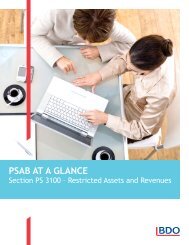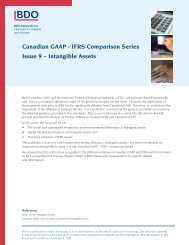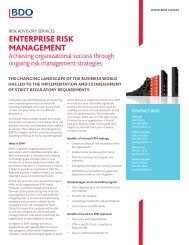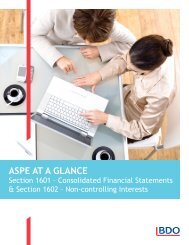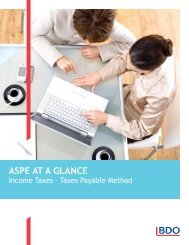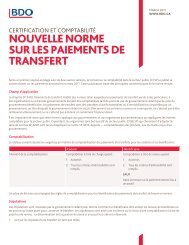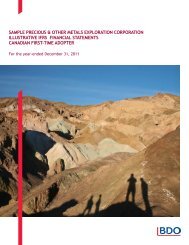Accounting Standards for Not-for-Profit Organizations - BDO Canada
Accounting Standards for Not-for-Profit Organizations - BDO Canada
Accounting Standards for Not-for-Profit Organizations - BDO Canada
You also want an ePaper? Increase the reach of your titles
YUMPU automatically turns print PDFs into web optimized ePapers that Google loves.
ACCOUNTING STANDARDS FOR NOT-FOR-PROFIT ORGANIZATIONS (ASNPO) UPDATE 20122These expenses are incurred when an organization has a right to access goods (i.e. when it owns them). The Section also says services arereceived when they are per<strong>for</strong>med by the supplier in accordance with their contract and not when they are used <strong>for</strong> another purpose. In thecase of catalogues or similar documents this means that they will be expensed when received from the supplier, not when they are deliveredto customers.This does not mean that prepaid advertising no longer exists, as an organization could still have a prepaid <strong>for</strong> amounts paid in advance ofreceiving goods or services.Subsequent EventsA new paragraph has been added to Section 3820, Subsequent Events, to clarify what is meant by the completion date of financialstatements. Financial statements are considered complete when:a. A complete set of financial statements, including all required note disclosures, has been prepared;b. All final adjusting journal entries have been reflected in the financial statements;c. No changes to the financial statements are planned or expected; andd. The financial statements meeting the above requirements have been approved in accordance with the organization’s process to finalizeits financial statements.The financial statement completion date is a critical date, as it is the date to which subsequent events must be considered.Financial InstrumentsA number to revisions have been made to Section 3856, Financial Instruments. The revisions all relate to Hedge <strong>Accounting</strong>. For morein<strong>for</strong>mation on Financial Instruments and Hedge <strong>Accounting</strong> see our publications “A Guide to Financial Instruments <strong>for</strong> Private Enterprises andPrivate Sector <strong>Not</strong>-<strong>for</strong>-<strong>Profit</strong> <strong>Organizations</strong>” and “A Guide to Hedge <strong>Accounting</strong> <strong>for</strong> Private Enterprises and <strong>Not</strong>-<strong>for</strong>-<strong>Profit</strong> <strong>Organizations</strong>.”Changes resulting from the <strong>Accounting</strong> <strong>Standards</strong> Board’s 2012 Annual Improvements Process are summarized below. These changes willalso be applicable to NPOs <strong>for</strong> year ends beginning on or after January 1, 2013, however early adoption is recommended. By adopting thesechanges early, they can be incorporated into the transition to ASNPO.Foreign Currency TranslationOriginally, Section 1651, Foreign Currency Translation, required an appropriate part of the <strong>for</strong>eign exchange gains and losses accumulatedin a separate component of shareholders equity to be included in net income when there was a reduction in the net investment. However,Section 1602, Non-controlling Interests, required a change in a parent’s interest in a consolidated subsidiary that does not result in a loss ofcontrol to be accounted <strong>for</strong> as an equity transaction.Section 1651 was amended to make it consistent with Section 1602 in its treatment of the related part of the <strong>for</strong>eign exchange gains andlosses accumulated in net assets.The amendment also clarified the accounting <strong>for</strong> <strong>for</strong>eign exchange gains and losses accumulated in a separate component of net assets, <strong>for</strong>various scenarios involving a full or partial reduction in an organization’s interest in a <strong>for</strong>eign operation.InvestmentsPreviously, Section 3051, Investments, did not provide guidance on the accounting <strong>for</strong> dilution gains and losses that resulted, <strong>for</strong> example,when an investee issues additional shares to third parties. The section was amended to require gains and losses resulting from the dilutionof an organization’s interest in an investee accounted <strong>for</strong> using the equity method, to be recognized in income. This treatment is consistentwith the accounting <strong>for</strong> a gain or loss arising from the sale of a portion of an investment.
Future ProjectsExposure Draft – Section, 3462, Employee Future BenefitsThis Exposure Draft proposes two significant changes. The first change is elimination of the option to use the deferral and amortizationapproach, which gives entities the option to defer the recognition of gains and losses on its defined benefit plans to future periods. Instead,entities would be mandated to account <strong>for</strong> defined benefit plans under the immediate recognition approach, which is the other optioncurrently allowed under ASPE. For more in<strong>for</strong>mation on this approach please refer to our publication entitled “ASPE’s Immediate RecognitionMethod: A Simplification to Post Employee Benefit <strong>Accounting</strong>.” This change would result in more volatility in an organization’s financialstatements. The second change is measuring plan obligations and plan assets at the balance sheet date rather than up to three monthsbe<strong>for</strong>e that date.The amendments related to this Exposure Draft would be effective <strong>for</strong> years beginning on or after January 1, 2014.Exposure Draft – Section 3475, Discontinued OperationsThis Exposure Draft proposes a higher threshold <strong>for</strong> disposals to be classified as a discontinued operation compared to the existingrequirements in Section 3475. As a result, fewer disposals would qualify as discontinued operations in practice. This change would bringSection 3475 in line with reporting under International Financial Reporting <strong>Standards</strong> (IFRS).The changes related to this Exposure Draft would be effective <strong>for</strong> years beginning on or after January 1, 2014.Joint <strong>Not</strong>-<strong>for</strong>-<strong>Profit</strong> ReviewThe AcSB which develops accounting standards <strong>for</strong> private sector NPOs and the Public Sector <strong>Accounting</strong> Board (PSAB) which establishesaccounting standards <strong>for</strong> governments and government organizations, including government NPOs, have established a Joint <strong>Not</strong>-<strong>for</strong>-<strong>Profit</strong> Task Force to improve accounting standards <strong>for</strong> future reporting of both private and public sector NPOs. Currently the task <strong>for</strong>ce isreviewing the content of the 4400 series of standards in Part II of the CICA Handbook – <strong>Accounting</strong> and the PS 4200 series of standards inthe CICA Public Sector <strong>Accounting</strong> Handbook. Deliberations are in progress and a statement of principles is expected to be approved andreleased in the near future.In addition, watch <strong>for</strong> upcoming Exposure Drafts from the <strong>Accounting</strong> <strong>Standards</strong> Board on Consolidations, Joint Arrangements and the 2013Annual Improvements in the near future.ConclusionAs we head closer to the end of the first year of actually applying ASNPO, now is the time to check with your <strong>BDO</strong> advisor about anythingyou want to know about your move to ASNPO or the changes to the standards made in 2012.The in<strong>for</strong>mation in this publication is current as of November 15, 2012.This publication has been carefully prepared, but it has been written in general terms and should be seen as broad guidance only. The publication cannot be relied upon to cover specific situations andyou should not act, or refrain from acting, upon the in<strong>for</strong>mation contained therein without obtaining specific professional advice. Please contact <strong>BDO</strong> <strong>Canada</strong> LLP to discuss these matters in the contextof your particular circumstances. <strong>BDO</strong> <strong>Canada</strong> LLP, its partners, employees and agents do not accept or assume any liability or duty of care <strong>for</strong> any loss arising from any action taken or not taken byanyone in reliance on the in<strong>for</strong>mation in this publication or <strong>for</strong> any decision based on it.<strong>BDO</strong> <strong>Canada</strong> LLP, a Canadian limited liability partnership, is a member of <strong>BDO</strong> International Limited, a UK company limited by guarantee, and <strong>for</strong>ms part of the international <strong>BDO</strong> network ofindependent member firms. <strong>BDO</strong> is the brand name <strong>for</strong> the <strong>BDO</strong> network and <strong>for</strong> each of the <strong>BDO</strong> Member Firms.


